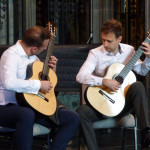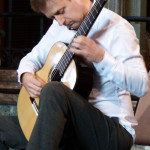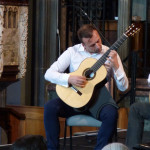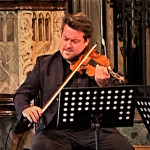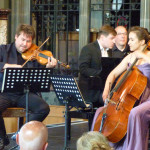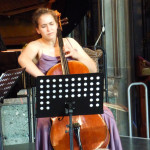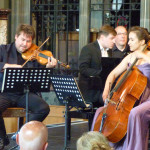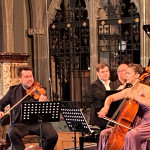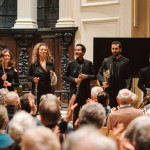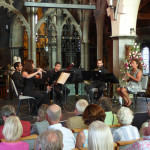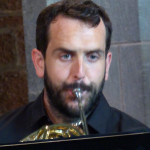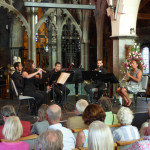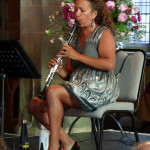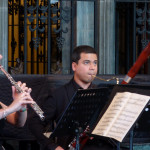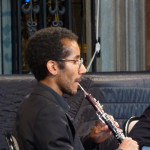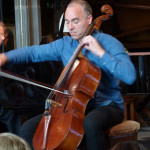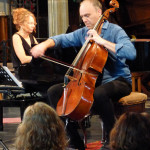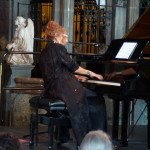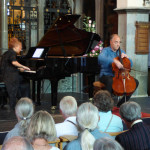Shaldon Festival 2023
Scroll the page or click on the performer’s name for photos and reviews for 2023.
Joanna MacGregor and Adrian Brendel
Review of Montenegrin Guitar Duo at the Shaldon Festival
Wednesday 21st June 2023
The opening concert of the 2024 Shaldon Festival season treated the audience to the delights of two guitar virtuosi, Goran Krivokapić and Danijel Cerović, who perform together as the Montenegrin Guitar Duo. This was the first time that the Festival had featured a whole evening of guitar music and it proved to be an enormous success. The artistry was perfect throughout: at times breath-taking, at others, soothing. They played with panache and accuracy, always maintaining a modest pose and warm connection with the audience.
The programme began with Bach’s English Suite No. 3 in G Minor, BWV 808 (1713), originally intended for harpsichord. The duo’s own transcription for two guitars provided all the intensity and intricacy of the original and enabled the audience to ‘tune-in’ to the rich sound of the two instruments. Krivokapić explained that the transcription was an ‘on-going journey’ and constantly evolving, requiring him at one point to refer to his score. It was an inspired choice for a scene-setting opener.
The pair then moved to Astor Piazzolla’s 1984 Tango Suite for two guitars. As well as the welcome swell of the ‘nuevo tango,’ for which the Argentinian composer is renowned, the piece included some surprises and unusual motifs, interspersed with reflective passages. The clear tone and sureness of their playing carried the audience through a beautifully expressive piece, mixing energetic and delicate themes.
After the interval we returned to Piazzolla, this time in another unusual piece, Suite Troileana (1976), which was written for the composer’s own electronic octet, comprising his beloved bandoneon, two electric pianos, guitar, electric bass, drums, synthesiser and violin, flute or saxophone. Krivokapić and Cerović once again brought out everything on their two guitars
The programme concluded with two pieces by the Andalusian composer Manuel de Falla (1876 – 1946), often referred to as Spain’s greatest composer. Both were from de Falla’s ballets: the Danza del Molinero (Dance of the Miller) (1919) from the ballet The Three Cornered Hat and Danza Ritual del Fuego (Ritual Fire Dance) from El amor brujo (1915) (The Bewitched Love).
It was a joy to be ‘back in Spain’ and the lively flamenco influences were enhanced with bold percussive playing. Again, the ability of the guitar to move easily from passion to pathos was evident and well used. The second of the brief pieces was a familiar dance tune, providing a rich Spanish flavour as a finale.
But the guitarists were not finished yet! Returning after a rapturous ovation, they introduced what was to be a delightful encore (which they had used in a Festival workshop that morning with guitar students at Teignmouth Community School.)
This was Circus Music Op.54a for 2 guitars by Italian guitarist Carlo Domeniconi. It was a rapid journey through nine brief pieces, each displaying extraordinary guitar skills and wonderful sense of humour: ‘The Argentinian Knife thrower’; ‘Spanish Riders on Greek Horses’; ‘The Wax Museum’; ‘Plik, the Flea of the Andes’; ‘Ural Magic Voice and the Don Cossaks’; ‘Fire Brigade “On Ice” ‘; ‘The Yogi who Disappears through the Key Hole’ and finally ‘The Orchestra Says Good-Bye.’
At times it was difficult to believe what was bring played but by now the audience was ready to follow them anywhere. A perfect end to a wonderful evening.
Richard Lamming
Review of the Trio Bohémo Concert at Shaldon Festival
Thursday 22nd June 2023
For the second concert of 2023 the Shaldon Festival welcomed Trio Bohémo, comprising three young Czech players, namely Jan Vojtek, piano, Matous Peruska, violin, and Kristina Vocetkova, cello. The Trio have quickly established their reputation as a phenomenal prize-winning ensemble, including winning the prestigious International Parkhouse Award in October 2021 in London.
A large audience in St. Peter’s church was anticipating an evening of fine music making from this well regarded young trio.
The programme consisted of three pieces. The first of which was Rachmaninov’s Elegiaque piano trio no. 2 in D minor Opus 9. A range of emotion expressed in the piece was accounted for by the fact that Rachmaninov had just learned of the death of Tchaikovsky, a composer he greatly admired. By turns melancholic, reflective and angry, the listener was assailed by the full expression of Rachmaninov’s grief. Close communication between the players, so vital in chamber music, gave rise to impassioned exchanges that were clearly heartfelt. For example, in the first movement there was a thunderous stormy passage played at full volume by all three players, followed by a delicate, muted cello section full of pathos. Sometimes the strings seemed to reproduce repeated, desperate screams. The varying moods of the piece required a vehement interplay that was energetically achieved by the players. The emotional light and shade was finely rendered and the audience was left feeling the sincerity of Rachmaninov’s grief.
After the interval we were treated to Dvorak’s Piano Trio in E minor Opus 90, ‘Dumky’. In a humorous speech, Matous Peruska assured the audience that the misery and depressive mood was largely over and lighter, more exuberant music was to follow. Each ‘dumka’ evoked an introspective mood that was at times balanced by lighter and happier sections – a style very much informed by the folk idiom. A noticeable aspect of the Trio’s playing was a genuine sense of joy and involvement with the piece. One felt that national affiliations were not far from the surface. A keen response to the changes in tempo, dynamics and mood was much appreciated. This much was evident by the rapturous applause of the audience, who recognised that the players had given their all.
The final piece of the evening was Liszt’s Hungarian Rhapsody no. 9 in E flat major, ‘Carneval de Pest’. This was certainly a rousing finale, as we were transported to 19th century Hungary and the colourful spectacle of a gypsy carnival in full flow. Liszt was a highly regarded pianist in his day and this was obvious from the virtuosic piano passages. Not to be outshone, the violinist and cellist were called upon to display flourishes of bow and pizzicato playing that brought to mind passionate gypsy dancing and boisterous carousing.
A stunningly wonderful performance. These young Czech players displayed a high level of professionalism whilst at the same time conveying a profound understanding and appreciation of the composers’ intentions.
What an exciting young Trio. Without doubt, many more international engagements lie ahead for them. They left Shaldon the following day to fly to Australia to compete in the prestigious Melbourne International Chamber Music Competition. We wish them well and hope that one day they may be able to return to the Shaldon Festival to delight us once again.
Review of Chineke! Wind Quintet Concert at the Shaldon Festival
Friday 23rd June 2023
The Chineke! Wind Quintet comprising players from the Chineke! Orchestra brought a varied and entertaining programme of wind repertoire for its concert at the Shaldon Festival on Friday night, many of the composers not widely known by the Shaldon Festival audience. Celebrating diversity in classical music is the founding ethos of Chineke! and it came as no surprise that the Wind Quintet included the music of two African-American composers: William Grant Still and Valerie Coleman.
The Quintet opened their programme with György Ligeti’s Six Bagatelles, one of his most popular works and a staple of most wind quintets. Composed in 1953, in these short transcriptions from his piano work, Musica Ricercata, each movement is based on a fixed number of notes in a chromatic scale. With most of the notes either played staccato or strongly accented the music was spiky and full of energy. The influences of Béla Bartók (the fifth Bagatelle is dedicated to him) and folk music feature heavily. The last bagatelle is marked “as though insane”. The bagatelles set the tone for the whole concert, mostly light-hearted and highly rhythmic; they were performed with great style and authority.
Introducing the second piece, flautist Meera Maharaj pointed out the emerging theme of the concert, namely arrangements of original piano pieces. Summerland by William Grant Still (the second of three Visions, written in 1935 originally composed for solo piano) is an elegy, a description in the composer’s mind of the serenity and purity of Heaven. Born in Mississippi on 11 May 1895, William Grant Still grew up in Little Rock, Arkansas. Still was a remarkable man and pioneer who achieved an astonishing number of firsts in his lifetime and was often referred to as the ‘Dean of Afro-American Composers’. He was the first African-American composer to conduct a major symphony orchestra, the first to have his own symphony performed by a leading orchestra, the first to have an opera performed on national TV and the first to conduct a major symphony in the Deep South.
Chineke! captured the dreamy and atmospheric feel of Summerland with its hints of Debussy. The gentle sweep of the melodic line first introduced by the flute then followed by oboe and bassoon was beautifully played.
In Paquito D’Rivera’s Lecuoneras from his Cape Cod files, it was the chance for the clarinet to shine. Francisco de Jesús Rivera Figueras, known as Paquito D’Rivera, is a Cuban-American alto saxophonist, clarinettist and composer. He was a member of the Cuban songo band Irakere and, since the 1980s, has established himself as a bandleader in the United States. We were treated to Mariam Adam playing the unaccompanied solo clarinet improvisations which D’Rivera devised around some of the melodies written by the foremost of the Cuban composers and pianist Ernesto Lecuona. It was stunning playing showcasing the full range of notes and technique possible with the instrument and loudly applauded by the audience.
Ending the first half was a performance of Paul Hindemith’s Kleine Kammermusik dating from 1922. This woodwind quintet is the only one of the “Kammermusik” series referred to as a “Kleine Kammermusik” (a small chamber piece), which suggests that Hindemith wanted to set this piece apart from the other works. It is written for standard wind quintet and the interplay of its instruments is in Hindemith’s characteristic witty vein. Chineke! conveyed the happy and boisterous nature of the opening march, a satire on Hindemith’s view of the military. After the second movement waltz, the third movement sounds much like an elegy, not a surprise from a composer who served on the front lines during the end of World War II. There was some lovely solo work in this movement weaving from one instrument to the next. The fourth movement, featured cadenzas for each instrument which demonstrated the virtuosic capabilities of each player. With a rousing final movement this was a polished performance.
The second half started with a spirited Danza de Mediodia, by the gifted Mexican composer Arturo Marquez first performed in 1996. The danzón is the official dance of Cuba, evolved from the habanera. British audiences have become familiar with his work courtesy of the Simon Bolivar Orchestra’s recording of Danzon No. 2. The American clarinettist Barbara Drapcho described the piece as sounding like an “outdoor party… with a horn/bassoon showdown…and the clarinet gets rock and roll”, adding “It has a raucous end”. Chineke! certainly did the piece justice with a lively humour and jazzy feel and it was a perfect vehicle for Andres Yauri on bassoon and Francisco Gomez on French horn to display their talent.
Ravel’s Le Tombeau de Couperin played in this concert in an arrangement for Wind Quintet by Mason Jones was composed between 1914 and 1917 originally as a piano suite. It was a tribute not only to a golden age in French music – the age of the great keyboard composer François Couperin – but also as a memorial to the war dead. At the time working as an ambulance driver at the front during World War I he was emotionally scarred having lost his mother and seen young friends of his beginning to die in the trenches. Every movement of Le Tombeau de Couperin is dedicated to the memory of a friend of Ravel’s, who had died fighting. Chineke! played three of the six movements: prelude, fugue and Rigaudon which is dedicated to brothers Pierre and Pascal Gaudin, lifelong friends of Ravel’s, who were killed by the same shell on their first day of service. Both the Ravel and Jones transcriptions feature the oboe and Armand Djikoloum demonstrated his virtuosity in crisply articulated playing and beautiful phrasing.
Concluding their programme Chineke! performed Valerie Coleman’s Red Clay and Mississippi Delta. As well as being the founder of Imani Winds, flautist Valerie Coleman is also an established composer, and has made many contributions to the repertoire for wind quintet. She was born and raised in Louisville, Kentucky, in the same West End inner city neighbourhood that boxer Muhammad Ali grew up in. About this piece she says: Red Clay and Mississippi Delta is a light scherzo work that references my family’s experience of living in Mississippi. From the juke joints and casino boats that line the Mississippi river, to the skin tone of my relatives from the area: a dark skin that looks like it came directly from the red clay. The solo lines are instilled with personality, meant to capture the listener’s attention as they wail with ‘bluesy’ riffs that are accompanied by the rest of the ensemble. The result is a virtuosic chamber work that merges classical technique and orchestration with the blues dialect and charm of the south.
It was performed with good humour and great fun to listen to; each instrument, and instrumentalist given the opportunity to display their unique personality whilst still interplaying with each other. Near the end they were snapping their fingers in time, even the audience joined in encouraged by the players. Andres Yauri was kept particularly busy on the bassoon and there were hints of improvisatory elements, especially in the clarinet.
In conclusion the young hugely gifted players of Chineke! Wind Quintet admirably demonstrated the art of ensemble playing as well as being virtuoso soloists, playing music that was basically good-natured but made diverse demands. My only disappointment was that Armand Djikoloum’s oboe solo, Le Ballet Espagnol by Silvestrini was cut from their programme and the performance concluded rather abruptly with no opportunity for an encore, leaving the audience wanting more.
Enid Hayles
Review of Joanna MacGregor and Adrian Brendel Concert at the Shaldon Festival
Saturday 24th June 2023
Both Joanna MacGregor and Adrian Brendel are renowned international musicians in their own right, so for them to come together to the Shaldon Festival of Music was a great privilege for us, and they were greeted with a very warm welcome from our receptive audience. To say that the piano “accompanied” the cello would be very misleading, for all the pieces in the programme gave equal prominence to both instruments.
Their concert began with Debussy’s sonata for cello and piano in D minor, one of the finest masterpieces for the cello and technically very demanding for both players. This was played superbly, the soloists in perfect resonance with one another. This was followed by Beethoven’s Sonata No. 3 in A major for cello and piano.
Clearly, this virtuoso work was well-known to, and well-loved by, the duo. In fact, Adrian played it from memory. The performance was brilliant and expressive and we went off to the interval in great spirits.
Upon our return we were given Le Grand Tango by Piazzolla. Written for Rostropovich, this challenging but delightful piece was really brought to life by our performers. The programme concluded with the well-known Sonata in A major for cello and piano by César Franck. In this work, as in all the rest of the programme, it was impressive to witness the coordination of the players; their entries, pauses, rubato passages, accelerandos and all aspects of tempo and dynamic were perfectly synchronised without any apparent communication between them. That’s what it means, your reviewer supposes, to be a pair of world-class musicians. They clearly enjoyed performing for us and the brilliant conclusion of the Franck sonata resulted in prolonged and rapturous applause.
The audience’s persistence was rewarded by an encore, Piazzolla’s Milonga del Ángel, the second part of the Ángel series, a composition from 1962 for piano, but arranged for cello and piano by Joanna. This charming piece brought the evening, and the 2023 Shaldon Festival of Music to a fitting conclusion. With performances like this, the Festival is assured of a really bright future.
Chris Morris

